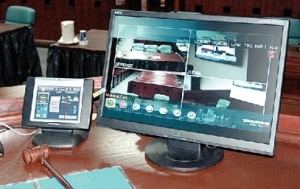Video conferencing system likely to help relieve congestion in courts
By Gary Popp
Published in News on November 4, 2010 1:46 PM

News-Argus/GARY POPP
A computer screen is seen on a judge's bench at the Wayne County Courthouse. The computer is part of a new video system that will allow court officials to hold routine hearings for inmates without having to bring the inmates up from the county jail.
The hardware for a high-tech communication system that will allow Wayne County court officials to handle routine hearings for inmates without moving them from the county jail is currently being installed and the system is expected to be online by the first of the year.
The new system will provide live video between the courtroom and the jail. It is similar to Skype, a software application used in many homes and businesses that permits people to see one another as they converse.
Superior Court Judge Arnold Jones has been one of the chief proponents of the system, which would be used mainly for first appearances and hearings involving probation matters.
It will save court officials time, and therefore save the taxpayers money, Jones said, and also will strengthen courthouse security.
The system is similar to other advanced communication systems already in use by some counties in the state.
"The video conferencing will be efficient and also provide more safety for our jail and courtroom staff, as well as being safer for the general public," Jones said. "By allowing the courts to address more cases, I am certain we can save taxpayers money."
Jones added that by helping move cases faster, the video system also could help keep the jail population down -- another way the county could save money.
District Attorney Branny Vickory is another strong supporter of the new video conferencing system. Vickory said he expects it to have multiple benefits. One of the biggest is that it will reduce the amount of time that his office and the Sheriff's Office spend transporting inmates to and from the jail, he said. That will make the entire judicial process more efficient, he said, and enable the court to hear more cases in a day.
"The system can assist in getting issues resolved quicker," Vickory said.
Vickory added that the system might be expanded at some point to allow lawyers to hold video conferences with their clients without even coming to the courthouse at all.
"It is possible, in the future, that lawyers will be able to communicate with inmates from their private offices," he said.
The new system consists of a network of monitors, speakers, cameras and microphones. Secure-line telephones are the final component of the network, which stretches through a superior courtroom, a room designated for district court judges, a room for lawyers and a room for inmates in the jail. The system ensures that conversations between lawyers and prisoners can be kept confidential, he noted.
The most sophisticated computer setup is in the courtroom. It consists of four cameras placed near the ceiling with a 60-inch flat-screen affixed to the wall over the witness stand. On the judges desk sits another monitor and control pad. With the control pad at their fingertips, judges can control what is seen and heard on the other segments of the network.
Maj. Ray Smith of the Wayne County Sheriff's Office has watched the recent installation of the conferencing system at the jail. He said it will benefit everyone involved in the court system, the judges, the lawyers, the jailers and the inmates, who might see their cases resolved quicker.
"I think it could be very beneficial as far as the jail goes," Smith said. "The change will make inmates more confined, and the chance of escape is kept at a minimum."
Lawyers will also benefit from the new system, Smith said.
"A lot of lawyers don't like going into the jail. This would eliminate that. They can go to a monitor instead of sitting down next to the inmate."
Training on the equipment will begin early this month in the Superior and District courts, the Clerk of Courts office, the district attorney's office, and among the bailiffs and jailers.
